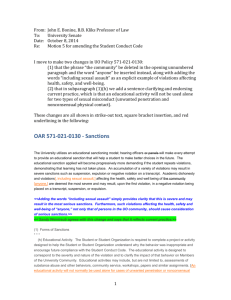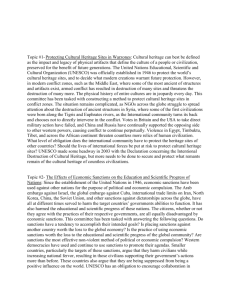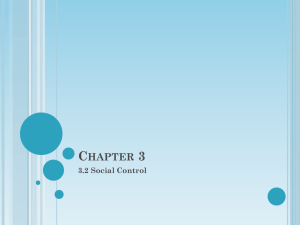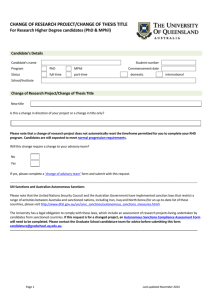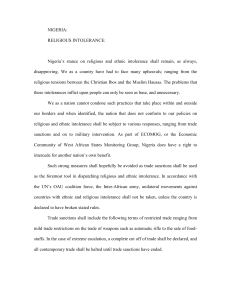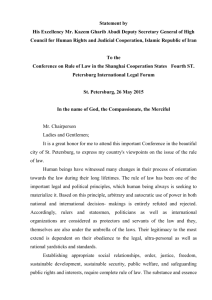Suffering AC
advertisement
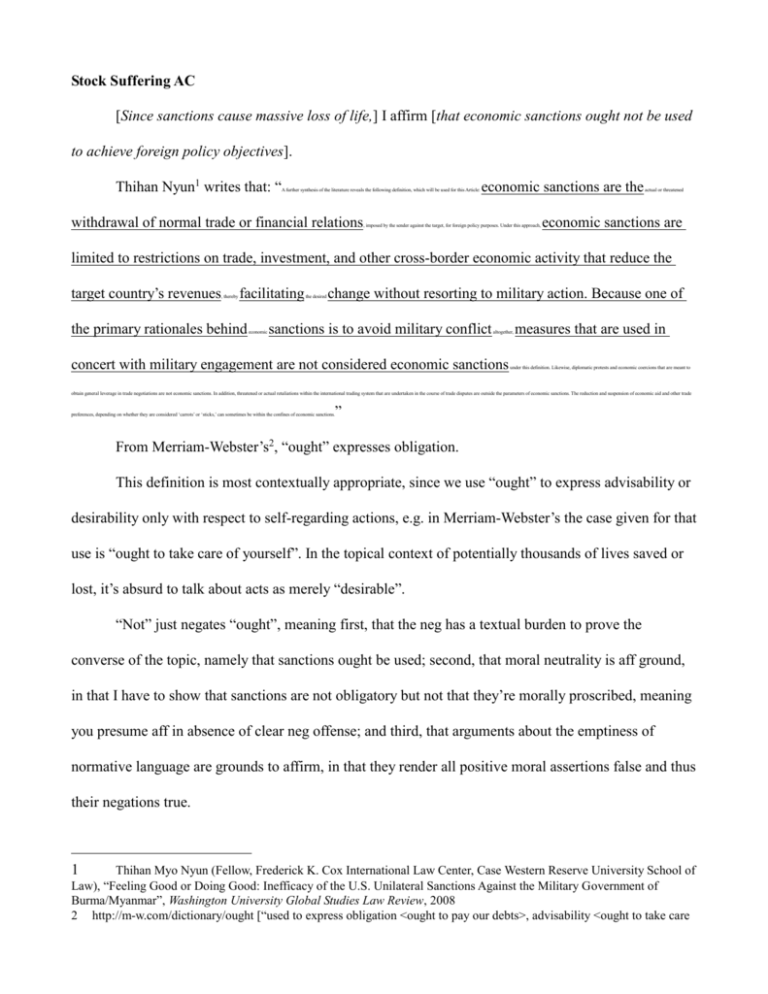
Stock Suffering AC [Since sanctions cause massive loss of life,] I affirm [that economic sanctions ought not be used to achieve foreign policy objectives]. Thihan Nyun1 writes that: “ A further synthesis of the literature reveals the following definition, which will be used for this Article: withdrawal of normal trade or financial relations economic sanctions are the , imposed by the sender against the target, for foreign policy purposes. Under this approach, actual or threatened economic sanctions are limited to restrictions on trade, investment, and other cross-border economic activity that reduce the target country’s revenues , thereby facilitating the primary rationales behind economic the desired change without resorting to military action. Because one of sanctions is to avoid military conflict altogether, concert with military engagement are not considered economic sanctions measures that are used in under this definition. Likewise, diplomatic protests and economic coercions that are meant to obtain general leverage in trade negotiations are not economic sanctions. In addition, threatened or actual retaliations within the international trading system that are undertaken in the course of trade disputes are outside the parameters of economic sanctions. The reduction and suspension of economic aid and other trade ” preferences, depending on whether they are considered ‘carrots’ or ‘sticks,’ can sometimes be within the confines of economic sanctions. From Merriam-Webster’s2, “ought” expresses obligation. This definition is most contextually appropriate, since we use “ought” to express advisability or desirability only with respect to self-regarding actions, e.g. in Merriam-Webster’s the case given for that use is “ought to take care of yourself”. In the topical context of potentially thousands of lives saved or lost, it’s absurd to talk about acts as merely “desirable”. “Not” just negates “ought”, meaning first, that the neg has a textual burden to prove the converse of the topic, namely that sanctions ought be used; second, that moral neutrality is aff ground, in that I have to show that sanctions are not obligatory but not that they’re morally proscribed, meaning you presume aff in absence of clear neg offense; and third, that arguments about the emptiness of normative language are grounds to affirm, in that they render all positive moral assertions false and thus their negations true. 1 Thihan Myo Nyun (Fellow, Frederick K. Cox International Law Center, Case Western Reserve University School of Law), “Feeling Good or Doing Good: Inefficacy of the U.S. Unilateral Sanctions Against the Military Government of Burma/Myanmar”, Washington University Global Studies Law Review, 2008 2 http://m-w.com/dictionary/ought [“used to express obligation <ought to pay our debts>, advisability <ought to take care I value morality as implied by the word “ought”. There's no concrete distinction between action and inaction in terms of the moral responsibility for harms, since the act-omission distinction produces paradoxical conclusions that render moral judgments impossible. Ingmar Persson writes3: “There are two ways in which the act-omission doctrine, which implies that it may be [is] permissible to let people die or be killed when it is [but] wrong to kill them, gives rise to a paradox. First, it may be that when you let a victim be killed, you let yourself kill this victim. On the assumption that, if it would be wrong of you to act in a certain fashion, it would be wrong of you [to] let yourself act in this fashion, this yields the paradox that it is both permissible and impermissible to let yourself act in this fashion. Second, you may let yourself kill action you have already initiated cause death, e. g., by not lending a pushed. This, too, yields [a contradiction] helping somebody by letting an hand to somebody you have the paradox that it is both permissible and impermissible to let yourself kill if you are in a situation in which [when] killing is impermissible but letting be killed permissible.” But further, since a categorical affirmation involved both the action of repealing sanctions and the inaction of not imposing new ones, while negation involves the action of creating new sanctions and the inaction of leaving current ones in place, there's no meaning distinction between “doing” and “allowing” in either world, making a comparison of end states the only coherent system of ethics. The standard is minimizing the imposition of suffering. First, all moral theories presuppose the moral value of persons as grounds for demanding that we treat them in some ways and not others. Further, since moral truths are neither observed in the empirical world nor arrived at by pure deduction, they’re necessarily developed by persons and societies to serve human interests and restrict harmful behavior. Failure to minimize suffering is thus immoral since it fails to treat the interests and wellbeing of persons as morally compelling grounds for action, negating the fundamental purpose of morals as guides to action. Second, in addition to being a utilitarian bad, the imposition of suffering violates deontic, rights- 3 of yourself>, natural expectation <ought to be here by now>, or logical consequence <the result ought to be infinity>”] Ingmar Persson (Department of Philosophy, Lund University, Kungshuset), “Two act-omission paradoxes,” Proceedings of the Aristotelian Society, vol. 104 (2), pp. 147-162, 2004 based standards of morality since imposing unnecessary suffering on others in the pursuit of social goods treats them as expendable means to the pursuit of external ends in which they may or may not share. Third, empathy for the suffering of others and unwillingness to let unnecessary suffering occur is the only psychological barrier against the worst moral atrocities like genocide. Basing state action on a willingness to cause suffering to achieve policy goals allows such atrocities to be justified whenever they putatively serve some pressing national interest. Finally, death is the worst form of suffering since it precludes moral theorizing and the search for moral truth. Since we lack definitive grounds for believing any particular moral theory, the only moral rule we can follow with confidence is to maximize our continued ability to engage in moral reasoning and chances of finding demonstrable moral truths, so moral agnosticism should lead us to default to the preservation of life as a presumptive moral good. Contention One: Sanctions directly impose suffering on the civilian population of target states. The direct denial of resources linked to the use of sanctions has caused one of the greatest humanitarian crises in history. Justin Stalls4 writes: “The human costs of suffering and death. Sever economic instrumental effects of economic sanctions upon the target state are in part economic but also include the sanctions are bound to impoverish the majority of the population, cause hyperinflation, retard the agricultural, industrial, educational, and health systems while spreading crime and corruption. In fact, Sending States ultimately believe that, “denying a nation the benefits of trade will cause it to suffer, and that suffering will induce a willingness to bargain”. As a result of this belief, sending States aim to make the consequences suffered by the target state as dire as possible. economic sanctions have contributed to more deaths “may destruction throughout history. during the For example, “various agencies of the United Nations. . .have estimated that they contributed to hundreds of thousands of deaths. [ post-Cold War than all weapons of mass economic era sanctions against Iraq alone] have ”. Even attempts to limit the ” This massive human cost is a direct result of economic sanctions financial cost of citizens are futile. Financial sanctions just worsen the situation in the target state since target leaders will shift the burden of sanctions onto their people through taxation and confiscations. 4 Justin Stalls, “Economic Sanctions,” University of Miami International and Comparative Law Review, Vol. 11, 2003. The impact is magnified since the people they’ll shift the burden onto will be the ones with the least power to resist, who are already worst off. Further, both comprehensive and targeted sanctions raise the threat perception to incumbent regimes by generating dissent against the state. Wood5 writes:: “ The first element of the theory constructed herein is that contribute to state -sponsored [S]anctions repression by constraining the resource flows of target leaders. In short, I argue that [A]s sanctions reduce the ability of incumbents to provide resources to supporters, the likelihood of defections increase. In order to repression. deter defections and maintain stability, target incumbents in turn augment their level of This effect is significantly influenced however by the political institutions of the target state. Political structures influence the probability that a state is the target of a sanctions event, as well as their duration. They likewise affect the ability of incumbents to use repression as a strategy to compel cooperation from a civilian population. Finally, institutions determine incumbents’ ability to allocate resources and redistribute costs. Incumbent survival is in large part a function of the ability to maintain a flow of resources to core supporters. Failing to maintain the flow of goods to the winning coalition threatens the stability of the regime because the incumbent must credibly promise more to her winning coalition than can any potential challenger. Costly sanctions make the credible promise of continued resources more difficult, which helps explain why costlier sanctions are more likely to destabilize target regimes. As the pool of available resources diminishes, sanctioned leaders must choose between conforming to the preferences of the sender and redistributing resources in a manner that protects supporters. If incumbents concede, the flow of resources presumably returns to normal and they can more easily reaffirm the stability of the regime. Often, however, targeted leaders – already the most recalcitrant regimes – refuse concessions and instead opt to redistribute available resources in the hope of weathering sanctions and waiting out their adversaries. Such [R]edistributions result[s] in net losses for some members of the winning coalition (as well as those excluded from the coalition), thereby reducing their loyalty to the incumbent. Falling loyalty degrades the stability of the regime and raises the incentives for incumbents to use coercion to prevent defections.” Rather than promoting regime change, this increases rights violations by creating an incentive to violently put down opposition. Dursun Peksen6 quantifies the impact: “According to [our] results the 115% increase in frequent violations , moving from no sanction to extensive sanctions leads to a for the economic sanctions (all) variable the predicted probability of frequent violations of disappearances, while it becomes 50% more likely when targets are facing partial sanctions. In the case of [E]xtrajudicial killings , become 64% and 29% more likely under extensive and partial sanctions, respectively. Similarly, moving from no sanctions to extensive sanctions increases the 57% for political imprisonment and 61% for torture predicted probability of frequent integrity right abuses by .” Thus, , while frequent violations become 27% more likely for political imprisonment and 30% for torture under partial sanctions sanction exacerbate ongoing repression in target states, worsening violations of rights. Contention Two: The imposition of sanctions risk escalation to global conflict. Imposing sanctions empirically increases the likelihood of militarized violence. Sprecher7 et al write:“ Table 2 summarizes the substantive Wood, Reed M. “‘A hand upon the throat of the nation’: Economic sanctions and state repression, 1976-2001.” International Studies Quarterly, vol. 52, 2006. 6 Dursun Peksen (Department of Political Science, East Carolina University), “Better or Worse? The Effect of Economic Sanctions on Human Rights,” Journal of Peace Research, vol. 46, no. 1, 2009, pp. 59–77 5 7 David J. Lektzian and Christopher M. Sprecher “Sanctions, Signals, and Militarized Conflict,” American Journal of effect of sanctions on the probability of a use of military force. Scenario 1 shows that the effect of sanctions initiated by a nondemocracy in a crisis is to reduce the probability of militarized conflict by about 58%. As we can see in scenarios 2 and 3, the result is changed greatly when the initiator of sanctions is a democracy. The probability of a militarized conflict increases by 195% when a democracy initiates sanctions in a crisis. Scenario 3 reveals the substantive difference between a democracy and a nondemocracy using sanctions in a crisis. Democracies are an astonishing 600% more likely to be involved in a militarized conflict following the use of sanctions than are nondemocracies. Observing these changes in predicted probabilities confirms our earlier expectation that the strength of the coefficient on sanctions in Model 4 is weakened due to the difference in dispute propensity after sanctions for democracies and nondemocracies. Scenarios 4-6 assess the effect of weak sanctions, designed for the sender to gain economically, on the probability of militarized conflict in a crisis. In scenario 4, we see that the overall effect of [weak] sanctions, regardless of sender regime type, is to increase the such probability of militarized conflict by 366%. As predicted, the change in probability of militarized conflict after weak sanctions is greater for nondemocratic states, whose ability to signal is governed solely by their ability to incur sunk costs. Nondemocratic states are generally better able to avoid militarized conflict following the use of sanctions because they do not tie their hands through the accumulation of audience costs as democratic leaders do. However, as seen in scenario 5, when nondemocracies send weak signals with sanctions, by crafting the sanctions in a way in which they will gain economically, they increase their probability of being involved in a military conflict by 420%. Democracies , on the other hand, are more likely to be involved in a militarized dispute following sanctions because of their propensity to accumulate audience costs that prevent them from backing down. when a democracy sends a weak sunk-cost signal while simultaneously facing audience costs, the probability of a militarized dispute occurring reaches near certainty, at a level greater than 90%. is when a democracy signals weakly by using costless sanctions, but simultaneously ties its hands through the accumulation of audience costs. Furthermore, scenario 6 shows that This helps confirm our expectation that the most conflict prone scenario ” And, the humanitarian cost of sanctions breed hatred of the sanctioning states, leading to terrorist backlash. David Cortwright8 notes: “The humanitarian disaster resulting from sanctions against Iraq has been frequently cited as a factor that motivated the September 11 terrorist attacks. Osama [B]in Laden himself mentioned the Iraq sanctions in a recent tirade against the U S .” Even if financial sanctions nited tates don’t have the same impact as those in Iraq, they still feed the perception of the West as bullying the Muslim world and thus make it easier for terrorists to find recruits and funding. Further, the only policy that gets 100 percent solvency for terrorism is disengagement from Mideast politics, which would Political Science, Vol. 51, No. 2 (Apr., 2007), pp. 415-431 Published by: Midwest Political Science Association Stable URL: http://www.jstor.org/stable/4620074 8 David Cortright (chair of the Board and Senior Fellow of the Fourth Freedom Forum in Goshen, Indiana and codirector of its Sanctions and Security Research Program; director of Policy Studies at the Kroc Institute for International Peace Studies at the University of Notre Dame), “A Hard Look at Iraq Sanctions”, The Nation, 3 December 2001, http://www.globalpolicy.org/component/content/article/170/42275.html remove any motivation for future attacks and which sanctions prevent, so at best they’re always suboptimal policy. But the failure of anti-terrorism sanction regimes increases the threat that terrorists pose. James Gurule9 writes: “The Security Council's Senior counter-terrorism international asset freeze program has reached a critical juncture. officials are less enthusiastic about the economic sanctions regime than ever before and Member States are reluctant to submit names for inclusion on the Consolidated List.’ Terrorist longer being frozen.’ As a result, al Qaeda every objective measure , the ment intemational economic and the Taliban retain[s] ample funding -related assets are no to sustain their operations and finance deadly terrorist attacks.’ Based on sanctions program appears to be failing.” And, the availability of weapons with devastating potential makes terrorism an existential risk. Oscar Falconi10 writes: “Less than a thousandth of an ounce of a certain bacterial toxin is enough to kill the entire human population. Bacteria , their toxins, and other substances that are even more deadly, very probably exist in many of the biological, and germ warfare laboratories of the world. secure [they] are they from theft Important questions are: Can these substances kill ALL human life? How chemical, bacteriological, [We do not know how] or leakage? Can [or if] they [can] be controlled if used? In 1974, at the now-famous Asilomar meeting, a group of 140 leading genetic researchers discussed the hazards of genetic manipulation, set guidelines, and pledged themselves to restrict certain aspects of their work in order to protect mankind from the potentially disastrous consequences of what modern science can create in a test tube. These scientists realized that they could produce a deadly virus or strain of bacteria against which there was no protection. From France: [concluded that] ‘The threat of disseminating new infectious germs that have never existed in nature could provoke uncontrollable epidemics.’” Even in sanctions are 100% effective in cutting off funding, weapons are already available and open to theft in the status-quo, making fund freezing ineffective. Shane Green11 furthers: “There are over 200 documented cases of persons attempting to purchase to make bombs) or tactical nuclear nuclear material (stuff weapons on the black market. There are over 100 ‘suitcase bombs’ missing from the Soviet nuclear inventory. This two feet] special 24" x 16" x 8" last item is probably the most important. The former head of Soviet National Security, Alexander Lebed testified to that fact before congress. He stated that the and can be set off by an individual in less than 30 minutes device measure[s] s approximately [about . Such a device, set off in New , producing a 1 kilo ton yield Gurule, Jimmy. “The demise of the UN economic sanctions regime to deprive terrorists of funding.” Case Western Reserve Journal of International Law, 41:1, 2009, p. 19-63. 10 Oscar Falconi (BS in Physics from M.I.T., physicist and consultant in the computer and electro-optical fields, has published articles on the theoretical limits of optical devices), “The Case For Space Colonization—Now!—and why it should be our generation's #1 priority,” 1981 11 Shane Green (40 years of work in the nuclear industry, including 7 years as Chairman of a Nuclear Technology Program at a major southern college, 2 years at the DOE PANTEX FACILITY, 5 years at Los Alamos National Laboratory and 2 Years at Oak Ridge National Laboratory), “Nuclear War Unthinkable?”, KI4U, 5 January 2007, online, http://www.ki4u.com/unthinkable.htm 9 York Harbor would produce a 15 to 20 foot wave that would destroy New York City. Other sources have confirmed that the number of suitcase bombs missing from the Soviet inventory is correct. Now, how do we detect such a device coming into the U.S.? Weapons grade plutonium, 94% Pu-239 produces a 414 KeV gamma ray, detectable and identifiable by gamma spectroscopy. It also contains approximately 6% Pu-240 that undergoes spontaneous fission, producing neutrons that can be detected by neutron detectors. It also contains Am-241 that produces 60 KeV gamma rays, again detectable by gamma spectroscopy. The significant quantity of weapons grade Pu is about 8 kilograms. The physical size of 8 [kilos of plutonium] Kgm of Pu 239 is about the size of a baseball. (Try to find that in a sea/land container.) Weapons grade uranium is approximately 93% U-235, producing a 186 KeV gamma ray detectable by gamma spectroscopy and 7% U-238, producing a 1001 KeV gamma ray from it's daughter Pa-234m, also detectable by gamma spectroscopy. The significant quantity is about 25 Kgm, a sphere about 7" in diameter. (Again, try to find that in a sea/land container.) inches of lead or tungsten. The radiological signature Four or five inches of steel would effectively reduce the radiations to background. of any of the gamma emitters could easily be shielded by a few ” Thus, since sanctions inflict massive suffering and generate existential risks, I affirm [and now stand open for cross-examination].


